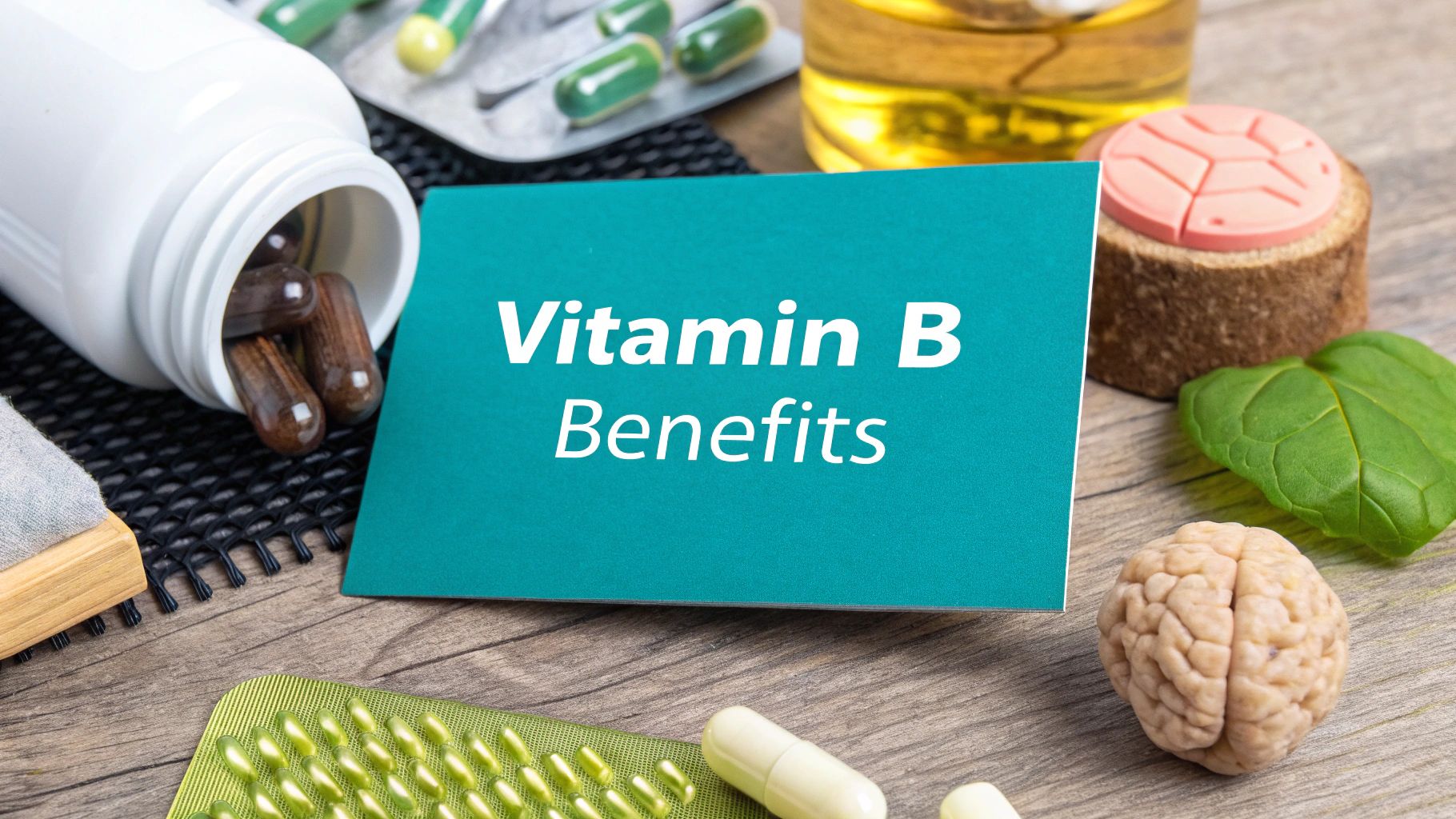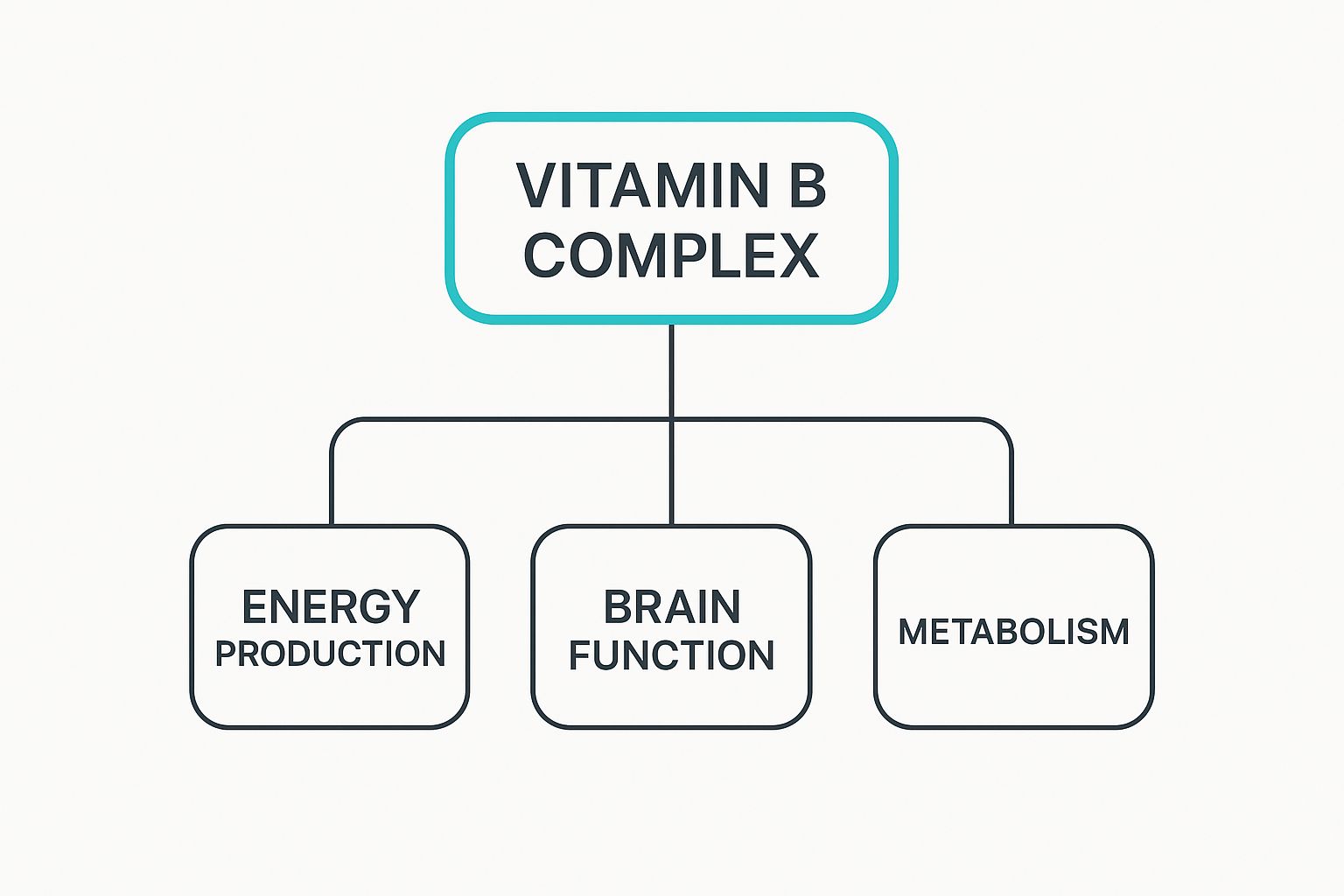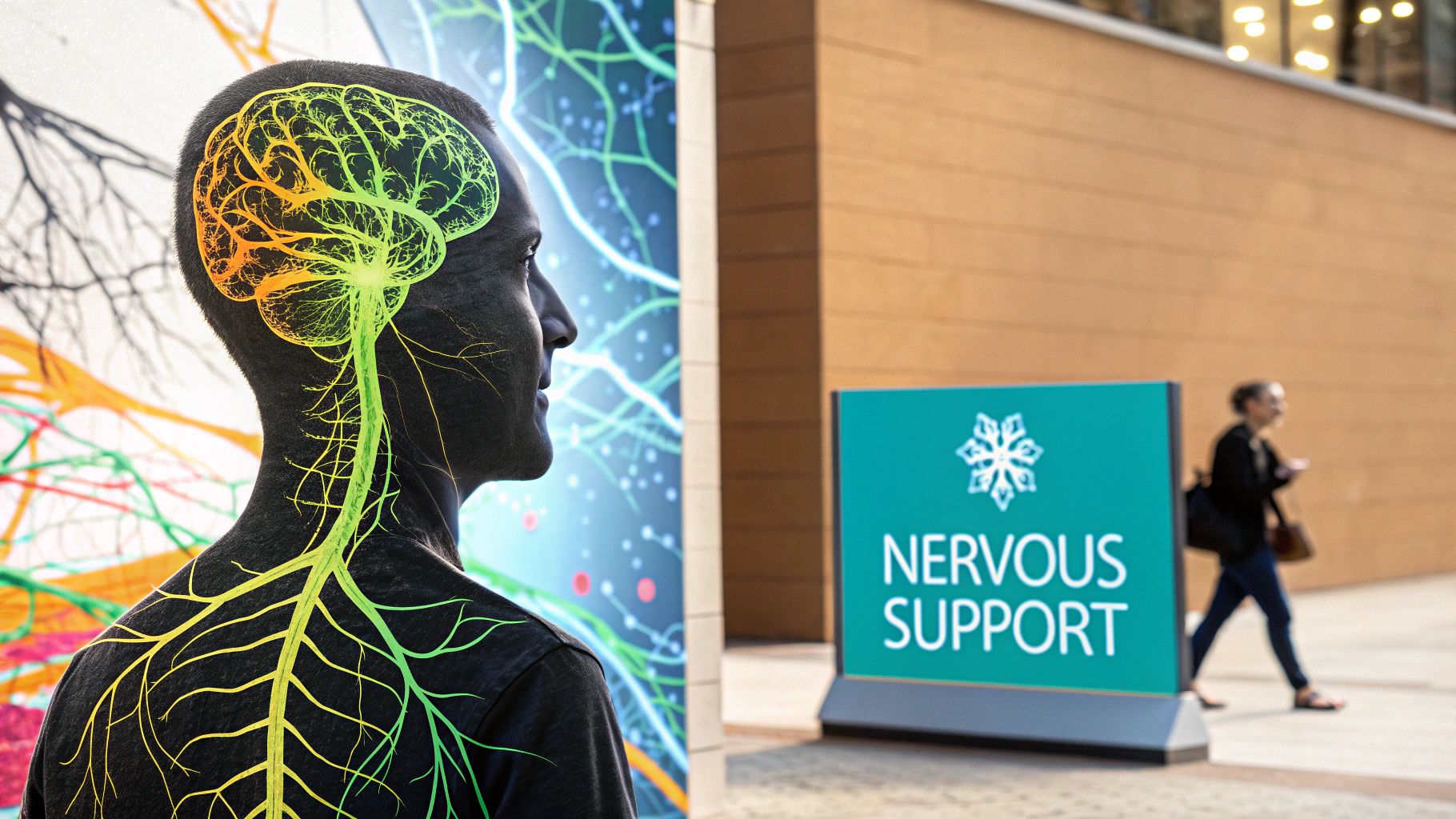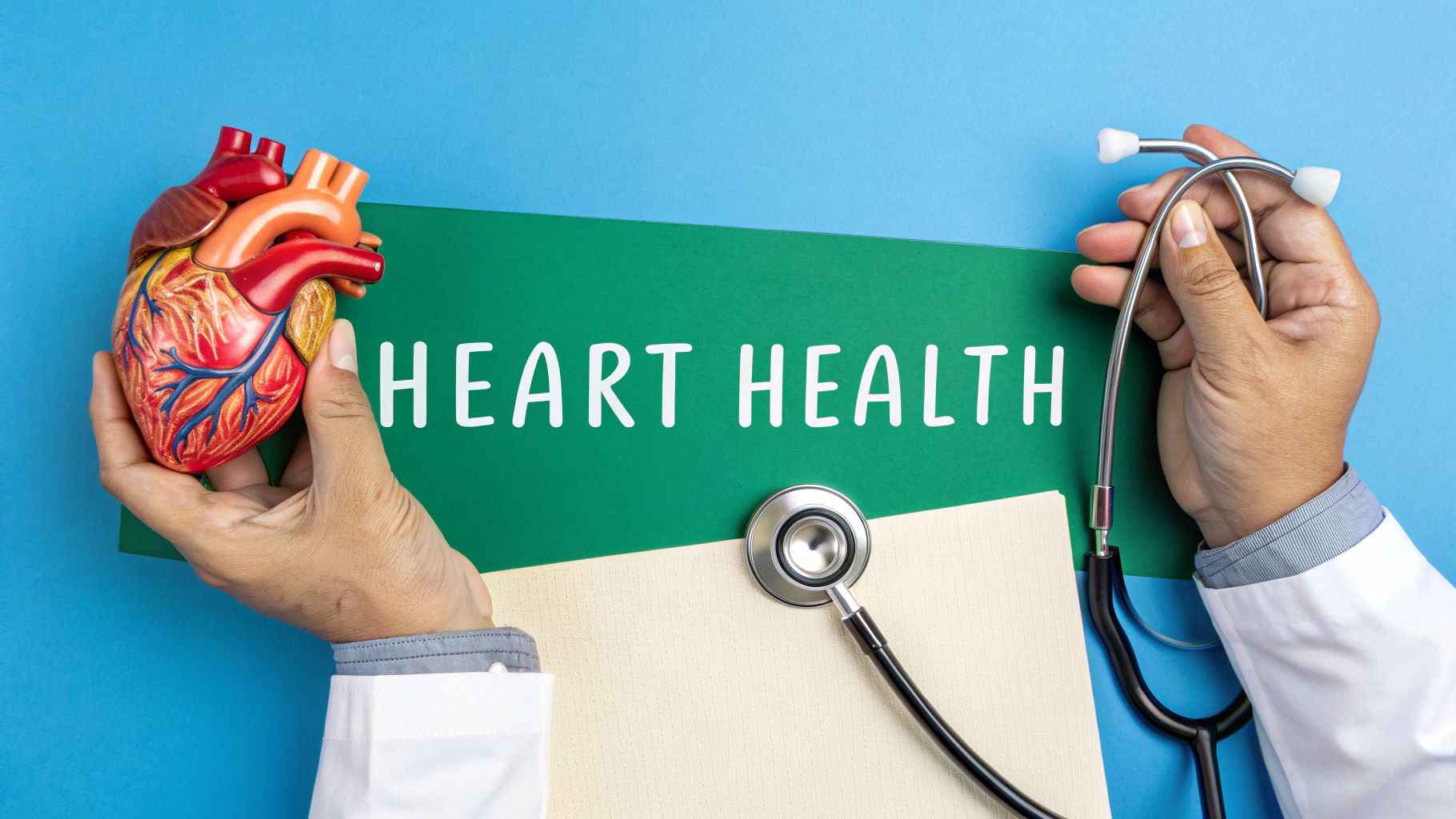

· By Annemarie
Benefits of Vitamin B Complex: Your Ultimate Guide
Vitamin B complex does a lot more than you might think. Its biggest claims to fame are boosting your energy levels, supporting brain function, and maintaining a healthy metabolism. This group of eight essential nutrients works together to turn the food you eat into fuel, keeping you sharp and ready to take on the day.
The Powerhouse Team Behind Your Health
Ever wonder what really keeps your body humming along every single day? While a lot of nutrients play a part, Vitamin B complex is like the dedicated crew chief running your internal operations. It isn't just one vitamin, but a team of eight distinct, water-soluble vitamins that are constantly working in sync.
Think of your body as a high-tech factory. Each B vitamin has a very specific job, but they all collaborate to make sure the final product—your overall health—is top-notch.
Let's do a quick roll call to get to know the team.
Meet the B Vitamin Team
Here’s a quick look at each of the eight B vitamins and what they're responsible for. Think of this as your "meet the players" guide to understanding who does what on the team.
| B Vitamin (Name) | Core Responsibility | Common Food Sources |
|---|---|---|
| B1 (Thiamine) | The initial spark that helps convert carbs into energy. | Pork, sunflower seeds, whole grains |
| B2 (Riboflavin) | A key player in cellular energy production and antioxidant defense. | Dairy, almonds, beef, mushrooms |
| B3 (Niacin) | Supports everything from metabolism to skin health. | Chicken, tuna, lentils, peanuts |
| B5 (Pantothenic Acid) | Helps create essential hormones and cholesterol. | Avocado, yogurt, chicken, broccoli |
| B6 (Pyridoxine) | Critical for creating neurotransmitters like serotonin. | Chickpeas, salmon, potatoes, bananas |
| B7 (Biotin) | Famous for its role in strong hair, skin, and nails. | Eggs, nuts, seeds, sweet potatoes |
| B9 (Folate) | Essential for DNA synthesis and cell growth. | Leafy greens, beans, asparagus, citrus |
| B12 (Cobalamin) | Vital for nerve function and red blood cell formation. | Meat, fish, dairy, fortified cereals |
As you can see, each one has a specialized role, but it’s their combined effort that really makes the magic happen.
This visual breaks down how the Vitamin B Complex supports three core pillars of your well-being.

It’s pretty clear from this diagram how interconnected everything is. That’s why the benefits of B vitamins are so wide-ranging and fundamental to just feeling good every day.
Why This Teamwork Matters
Here's the thing: no single B vitamin can do its job properly without the others. They're codependent. For instance, B12 and Folate (B9) are partners in crime for making red blood cells. If you're short on one, the other can't function right, which can leave you feeling tired and weak.
This is exactly why a "complex" is so effective—it gives your body the whole toolkit it needs for all these critical processes.
Their collective role is so important that it's fueling some serious market growth. The global market for vitamin B complex ingredients flew past USD 3.49 billion in 2025 and is expected to hit USD 4.81 billion by 2033. You can dig deeper into this growing demand for B vitamins and its market trends if you're curious.
You could say B vitamins are the microscopic managers of your well-being. They're in charge of energy conversion, brain communication, and cell repair, making sure every system has what it needs to run smoothly.
Without this crew, simple things like turning your lunch into afternoon energy would grind to a halt. In the next few sections, we’ll get into exactly how this powerhouse team fuels your body, sharpens your mind, and a whole lot more.
Fueling Your Body for Peak Performance

Ever feel like you’re running on fumes, even right after a big meal? The problem might not be the fuel you're putting in, but how your body is actually using it. This is where vitamin B complex really shines, acting like the tiny mechanics that keep your body’s engine humming.
Think of it this way: your metabolism is like a car engine. The carbs, proteins, and fats from your food are the gasoline. But gasoline is pretty useless without a spark to get things going.
B vitamins are those essential spark plugs. They kick off the chemical reactions that turn your food into adenosine triphosphate (ATP)—the high-octane energy currency your cells run on. Without them, your engine just sputters.
This isn’t a one-vitamin job, either. It’s a total team effort. Each member of the B-complex family has a specific role to play on the energy conversion assembly line, making sure every last drop of fuel gets used.
The Energy Conversion Crew
To really get how B vitamins rev you up, let’s look at the key players on the front lines of your metabolism. These three are especially critical for turning what you eat into the get-up-and-go you need every day.
- B1 (Thiamine): This is your first responder. It gets the whole process started by helping break down carbohydrates into glucose, which is the body's go-to source for quick energy.
- B2 (Riboflavin): Once that initial breakdown is done, Riboflavin jumps in. It helps shuttle electrons around during the energy production cycle—a must-have step for creating ATP.
- B3 (Niacin): This one is a true powerhouse. Your body converts it into a molecule called NAD, which is involved in over 400 different enzymatic reactions. A huge number of those are central to keeping your metabolism fired up.
When this team is working in sync, your body becomes an efficient energy-producing machine. You feel more alive, sharp, and ready to take on whatever the day throws at you without that dreaded crash.
A B vitamin deficiency is like trying to start your car with faulty spark plugs. No matter how much gas is in the tank, the engine won't run right, leaving you feeling tired and sluggish.
Making sure you have enough B vitamins keeps your metabolic engine firing on all cylinders. If you're looking for more ways to support your vitality, we've got some great tips in our guide on how to boost energy naturally, which goes hand-in-hand with the role of B vitamins.
At the end of the day, a well-fueled metabolism directly translates into sustained energy, helping you feel and perform your best.
Supporting Your Mood and Brain Function

We all know B vitamins are famous for kicking our physical energy up a notch, but their power over our mental and emotional game is just as real. Picture your brain as a super-fast, super-busy data network. To keep it from crashing, it needs a steady stream of very specific supplies.
This is where the vitamin B complex steps in. Think of key players like B6 (Pyridoxine), B9 (Folate), and B12 (Cobalamin) as the master architects of that neural network, making sure your brain's communication lines are clear and humming along. They're absolutely essential for creating neurotransmitters—the tiny chemical messengers that carry signals all over your brain.
When you don't get enough of these B vitamins, that internal data network can start to lag. That’s when you run into frustrating things like brain fog, finding it impossible to concentrate, or just feeling... down.
The Architects of Your Mood
So, let's zoom in on how these specific B vitamins actually build your mental clarity. They’re directly involved in cooking up the "feel-good" chemicals that keep your emotions and focus on an even keel.
- Vitamin B6 (Pyridoxine) is a non-negotiable ingredient for producing serotonin and dopamine. Serotonin is the mood, sleep, and appetite regulator, while dopamine is all about motivation and focus.
- Vitamin B9 (Folate) teams up with B12 to keep nerve function healthy and to help make those same crucial neurotransmitters. It’s no surprise that low folate levels are often linked to low moods.
- Vitamin B12 (Cobalamin) is mission-critical for maintaining the myelin sheath, which is like the protective insulation around your nerve cells. A healthy myelin sheath means your brain cells can talk to each other quickly and clearly.
When your body has plenty of these nutrients, your brain's signaling is fast and sharp. The result? Better focus, a more stable mood, and an easier time rolling with the punches. If you're constantly fighting through a mental haze, learning what causes brain fog can shed some light on why these vitamins are so important.
The word is out on these neurological benefits, which is a big reason why vitamin B complex is such a major player in the market. Globally, it makes up about 29.4% of the vitamin ingredients market's revenue share. That's a sector expected to jump from USD 9.8 billion in 2025 to a whopping USD 18.6 billion by 2035. You can dig into more of these market trends on futuremarketinsights.com.
Just like a data network needs quality cabling to prevent signal loss, your brain needs B vitamins to protect its nerve pathways. This protection is what helps you maintain cognitive clarity and emotional balance day after day.
By supporting the very structure and function of your brain cells, the vitamin B complex lays the groundwork for sharp thinking and a positive outlook, helping you stay on top of your game—mentally and emotionally.
Unlocking Healthy Skin, Hair, and Nails
That healthy glow, strong hair, and smooth nails we all want? It's often seen as just surface-level beauty, but it’s actually a direct sign of what’s happening inside your body. One of the best-kept secrets of B complex vitamins is their role as a foundational toolkit for building and maintaining these key features from the inside out.
Imagine your body is a major construction site for all things beauty. B vitamins are the specialized workers on the ground, laying the groundwork for strong, vibrant structures. They aren't just patching up problems; they're building everything correctly from the cellular level up.
When it comes to this internal construction crew, a few key B vitamins are the real MVPs.
The Beauty-Building B Vitamins
A couple of members of the B vitamin family are particularly famous for what they do for your hair, skin, and nails. They each have a specific job, but they work together to create a visible difference in how you look and feel.
-
Biotin (B7) The Strength Specialist: Biotin is absolutely essential for producing keratin, a tough protein that is literally the building block of your hair and nails. Getting enough biotin helps give hair its structure and nails their resilience, keeping them from becoming brittle and weak.
-
Niacin (B3) The Skin Protector: Niacin plays a huge part in maintaining your skin's protective barrier. This barrier is what locks in moisture and keeps out environmental irritants—a must for a smooth, hydrated, and even-toned complexion. A strong skin barrier means less dryness and irritation.
When these vitamins are running low, the results can start to show up on the outside. Brittle nails that break easily, hair that seems dull or thin, and skin prone to dryness or breakouts can all be signals that your body is asking for more of these key nutrients.
Think of Biotin as the rebar that reinforces a concrete structure, giving hair and nails the core strength they need to resist damage. Niacin then acts like a sealant on that structure, protecting the surface from the elements.
Ultimately, giving your body a steady supply of these B vitamins is like investing in a long-term beauty strategy. Instead of just treating the surface, you're nourishing the very systems responsible for producing healthy skin, strong hair, and resilient nails. It creates a natural radiance that topical products alone just can't replicate.
How to Get the Right B Vitamins for You

Knowing the benefits of B vitamins is great, but putting that knowledge into practice is where it really counts. The good news? Your body can get these essential nutrients from two main sources: the food you eat and well-chosen supplements.
For most of us, a balanced diet filled with whole foods is the best place to start. B vitamins are scattered across a wide variety of ingredients, so focusing on a colorful and diverse plate is a simple, effective strategy. That said, some B vitamins are more concentrated in certain food groups.
Finding B Vitamins on Your Plate
Building a diet that naturally includes the entire B complex team doesn't have to be complicated. Here’s a quick rundown of some of the best food sources to help you meet your daily needs and unlock those benefits.
- Leafy Greens (B9): Spinach, kale, and romaine lettuce are loaded with Folate, which is absolutely critical for cell growth and DNA synthesis.
- Whole Grains (B1, B2, B3, B6): Think brown rice, quinoa, and oats. These are excellent sources of multiple B vitamins that directly fuel your metabolism.
- Lean Meats and Fish (B3, B6, B12): Chicken, salmon, and tuna deliver a powerful dose of Niacin, Pyridoxine, and Cobalamin, supporting everything from brain function to energy production.
- Eggs and Dairy (B2, B7, B12): These are fantastic all-rounders, especially for Biotin and Riboflavin, which are vital for healthy skin and converting food into fuel.
- Legumes (B1, B9): Beans, lentils, and chickpeas are plant-based powerhouses for Thiamine and Folate.
When to Consider a Supplement
While a food-first approach is always ideal, supplements can be a practical and sometimes necessary tool. Think of a supplement as a safety net, ensuring you get consistent, optimal levels of these water-soluble vitamins that your body can’t store for later.
Some people are at a higher risk of deficiency and can benefit significantly from a B complex supplement.
Older adults, individuals on plant-based diets, pregnant women, and those with certain gastrointestinal conditions often have a greater need for B vitamins or may struggle with absorption from food alone.
The convenience of capsules has made supplementation a go-to for many. In fact, the market for vitamin B complex capsules is projected to hit USD 2.5 billion by 2025, with an expected growth rate of 7% annually through 2033. This trend really highlights a growing public awareness of just how important these vitamins are.
When picking a supplement, look for one that contains all eight B vitamins. This ensures you’re getting their synergistic benefits—they truly work better together. These nutrients also play a role in detoxification pathways, and learning about key supplements for liver health can give you a better picture of how different vitamins support your body's vital organs. Making an informed choice helps you align your supplement routine with your specific health goals.
Your B Complex Questions, Answered
Jumping into the world of supplements can feel a little overwhelming. When it's something as important as Vitamin B Complex, you want to be sure you're doing the right thing for your body. Let's clear up some of the most common questions about daily use, timing, and what you should expect.
Can I Take Vitamin B Complex Every Day?
Absolutely. For most of us, taking a B complex supplement every day isn't just safe—it's actually a great idea. B vitamins are water-soluble, which is a fancy way of saying your body doesn’t hang onto them for very long.
Think of it this way: your body uses what it needs for the day, and then any extra is simply flushed out. This is why a consistent, daily top-up is the best way to keep your levels steady for all those crucial jobs, like making energy and keeping your brain sharp. As always, stick to the dose on the label or have a chat with your doctor.
Key Takeaway: Since your body doesn't store them, daily intake of B vitamins is the best way to ensure your cells have a consistent supply to support metabolism and neurological health.
What Is the Best Time to Take B Complex?
Hands down, the best time to take your B complex is in the morning with your first meal. This timing just makes sense, since the main gig for these vitamins is to help convert your food into fuel.
Taking them at the start of your day can give you a real boost in energy and focus. Plus, having some food in your stomach helps your body absorb the nutrients and avoids any potential tummy troubles. Some people even find that taking B vitamins too late in the evening can be a bit too energizing and might mess with their sleep.
How Long Does It Take for Vitamin B Complex to Work?
How quickly you'll feel a difference really varies from person to person. It all comes down to where you're starting from.
- If you're running low: You could feel a noticeable shift in your energy and mood in just a few days or weeks.
- If you're just topping up: The benefits might be more of a slow burn. You may just gradually realize you're handling stress better or feeling a bit more clear-headed over time.
The biggest thing is consistency. Give it at least a month of daily use to let your body really replenish its stores. That's the best way to truly see what it can do for your overall well-being.
Ready to experience these benefits for yourself? The Upside Hangover Sticks are expertly formulated to replenish key nutrients, helping you feel your best. Get yours today at https://enjoyupside.com.
